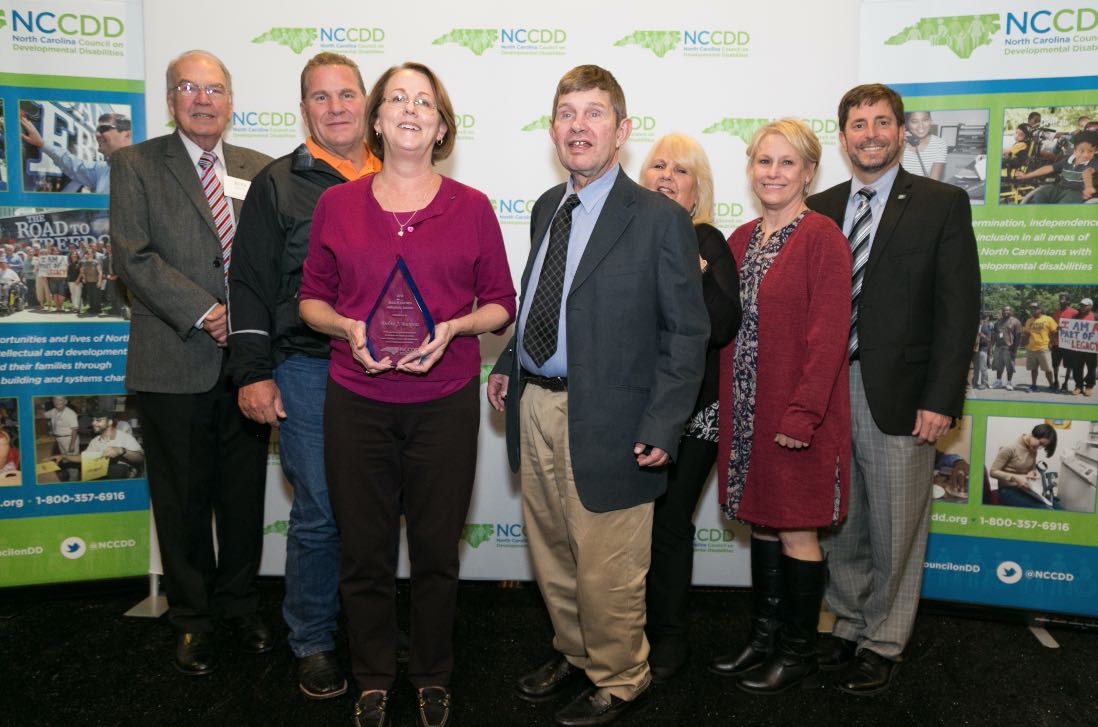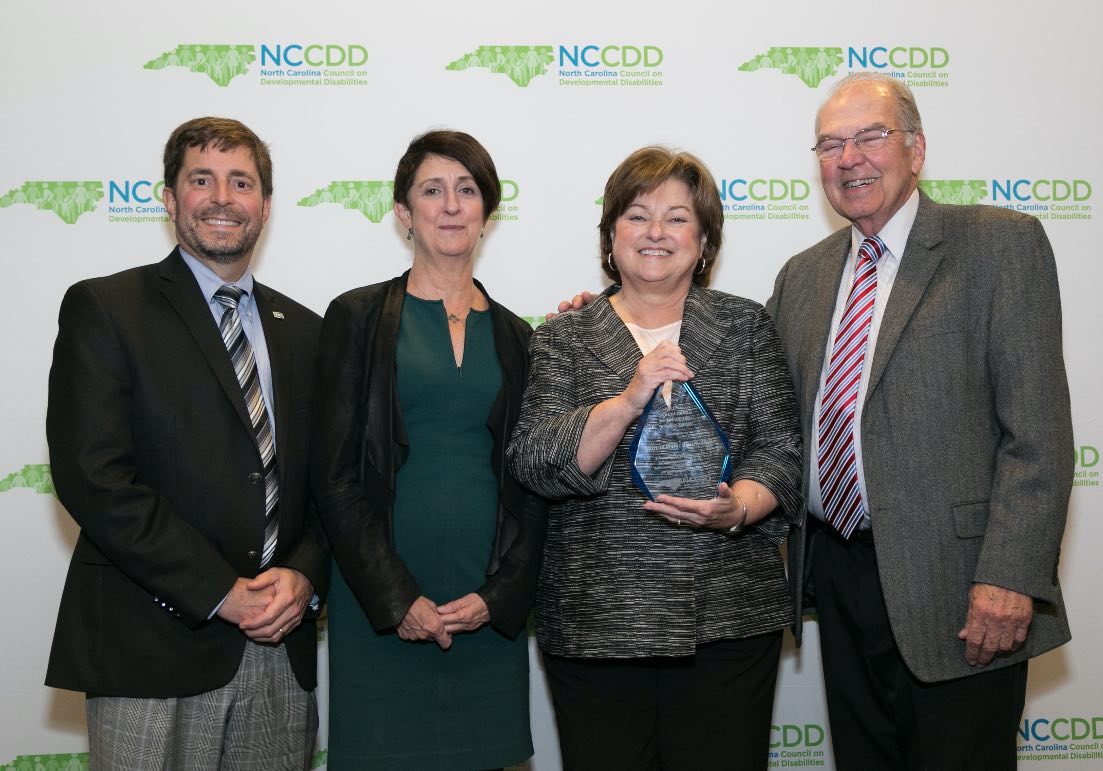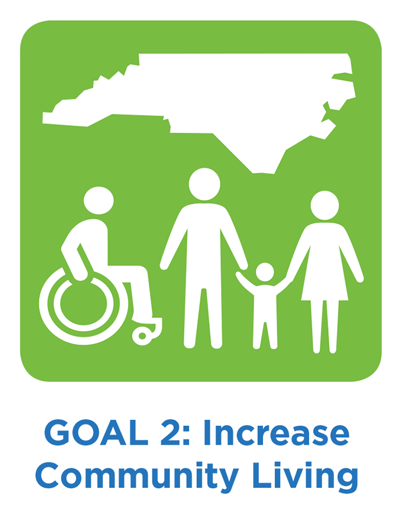November/December 2016: Highlights and Hot Topics

Download a pdf of the Nov/Dec newsletter here.
A Message from Our Executive Director
This is the season of giving thanks and celebrating community! It is also a busy time between the work leading up to our annual meeting in November and preparing for a short month in December, so we combined the November and December editions of Highlights and Hot Topics. At our meeting in November, we gave thanks and recognition to two strong advocate leaders in North Carolina who are advancing disability rights: Debra J. Burgess and Patricia Porter received the Jack B. Hefner Memorial Award and Helen C. “Holly” Riddle Distinguished Service Award, respectively, during the Council’s annual meeting and awards reception.
In addition to honoring career-long advocates, we also had the pleasure of hearing from Timothy Balogh, a future leader, who spoke about growing up with a disability, the importance of community, a network of support, and how he is living the life of his choosing. His powerful message received a cheering ovation, and I strongly encourage you to take a moment to hear and share his message.
Listening to the needs and interests of individuals across the state, NCCDD is able to convene learning opportunities and thought leaders from various communities. During the November Council meeting, we hosted panels on the NC Innovations Waiver and the Workforce Innovation and Opportunity Act (WIOA). We heard from representatives of the NC Department of State Treasurer on the progress implementing the Achieving a Better Life Experience (ABLE) Act. Finally, staff and members celebrated the federal approval by the Administration on Intellectual and Developmental Disabilities of our new Five Year Plan, setting the stage for important and exciting work ahead.
There has been a lot of progress to support the community of individuals with I/DD, and the Council is continuing its work to reach out to our entire state to make sure inclusion and integration are possible for everyone. I encourage you to review our 2016 Annual Report mentioned below.
Chris Egan
Executive Director
Jill Hinton and Erika Hagensen, policy consultants for the North Carolina Council on Developmental Disabilities (NCCDD), provided an overview of state and federal legislative and policy issues. State topics included:
· Innovations Waiver implementation
· Disability Rights North Carolina (DRNC) Settlement – Children with Intellectual and other Developmental Disabilities (I/DD) and Complex Behavioral Health Needs
· 1115 Waiver implementation
· Redistricting
The NC Innovations Waiver amendment has been approved by the Centers for Medicare and Medicaid Services (CMS) and was implemented on November 1, 2016. New services in the waiver include Community Living and Supports, Supported Living, and Community Navigator. The Supported Living services allow up to three individuals to live together without the home being licensed. This new service promotes self-direction and community living. There are changes to several other existing services, but the most significant waiver change is the move to Resource Allocation, which is based on the Supports Intensity Scale, the age of the individual and the living situation. Individuals and families are encouraged to ask for what is needed regardless of what level results from the Resource Allocation process. In addition, individuals and family members are encouraged to ask questions and seek more information from their LME/MCO as they receive letters regarding their new base budget.
Council member and Executive Director of DRNC Vicki Smith spoke about the DRNC settlement on children with I/DD and complex behavioral health needs. Smith said, “We’ve been following this since 2009. There are approximately 500 children who are Medicaid-eligible and will be impacted.” The goal is to improve access to services, create uniform practices to assess children for consistent care, provide appropriate medical and psychiatric services, authorize case management services, and begin operating one outpatient clinic starting in April 2017.
The 1115 Waiver (Medicaid Reform) was submitted to CMS on June 1, 2016. The expectation was that there would be no feedback from CMS until after the election, so North Carolina is still waiting on that response. In the meantime, input is being provided to the NC Department of Health and Human Services through the I/DD Medical Health Homes Initiative to ensure I/DD is included in a comprehensive manner within the 1115 Waiver.
The Legislature will be called into a special session in December to redraw voting districts as required by the panel of three federal judges who ruled in August that current districts are unconstitutional. On November 29, a federal court ordered North Carolina to hold a special legislative election in 2017 after the 28 state House and Senate districts are redrawn to comply with the gerrymandering ruling.
Read more here: http://www.newsobserver.com/news/politics-government/state-politics/article117843388.html#storylink=cpy
At the federal level, we have little information on the disability policy platform or objectives of the incoming Trump administration. With no disability-specific campaign platform or previous voting history to draw from, the disability community will be monitoring current statements, cabinet appointments, and President-elect Trump’s first efforts in office to inform a broader understanding. We do know that he spoke favorably of many policy changes that could dramatically impact individuals with I/DD, some of which include repealing or altering the Affordable Care Act, block granting Medicaid, privatizing Medicare, and reducing taxes, thereby lowering funds available for “discretionary spending” areas like housing, education, employment and transportation.
Many of these proposed policy changes are supported by the leadership of the Republican-controlled House and Senate and would likely be favorably received. Accepting a unanimous re-nomination as Speaker of the House, Paul Ryan (R-WI) said he’s ready to “go bold and go big” in the upcoming 115th Congress, which starts in January.
Every election at the local, state and federal level offers the opportunity to inform and educate both incoming and longstanding elected officials about the lives of individuals with I/DD. The NCCDD has a unique opportunity to:
1) Inform the North Carolina legislators and administrators about NCCDD’s Five Year State Plan and legislative goals with the help of self-advocates.
2) Support the I/DD Caucus’s efforts.
3) Be a resource at both the state and federal level for issues relating to the I/DD community.
4) Maximize the unique capacity and representation of Council members.
5) Create further dialogue through systems change grants.
6) Demonstrate our effectiveness as a non-partisan, cross-sector collaborator.
If you would like to help with these outreach efforts, contact NCCDD at 919-850-2901 or at 1-800-357-6916.
They are among 70 who are interning at nine sites, primarily hospitals, throughout North Carolina through Project SEARCH, a model launched in 1996 in Cincinnati.
Funding several of the North Carolina programs has been the North Carolina Council on Developmental Disabilities. The council, a stand-alone state agency mandated and funded by the federal government, works to give people with disabilities and their families access to – and a voice in shaping – services and support they need. - See more at: http://nccdd.org/news-media/in-the-news/335-triangle-business-journal-hospital-partnership-aids-individuals-with-disabilities.html#sthash.40OFSeU0.dpuf
Debra J. Burgess and Dr. Patricia Burns Porter Honored at Advocacy and Leadership Awards Deby Burgess (front) with the Hefner Family, Ron Reeve and Chris EganDebra J. Burgess and Dr. Patricia Burns Porter were recognized for their outstanding contributions in advocacy and leadership by the North Carolina Council on Developmental Disabilities (NCCDD) at its Advocacy and Leadership Awards Reception on November 16 at the Hilton Garden Inn in Cary, NC.
Deby Burgess (front) with the Hefner Family, Ron Reeve and Chris EganDebra J. Burgess and Dr. Patricia Burns Porter were recognized for their outstanding contributions in advocacy and leadership by the North Carolina Council on Developmental Disabilities (NCCDD) at its Advocacy and Leadership Awards Reception on November 16 at the Hilton Garden Inn in Cary, NC.
Burgess, parent and senior research assistant at Duke University for the Fragile X Project, was awarded the coveted Jack B. Hefner Memorial Award, which celebrates the vision and achievement of advocacy by North Carolina's families and people with intellectual and other developmental disabilities (I/DD).
 Pat Porter (third from left) with Chris Egan, Holly Riddle and Ron Reeve
Pat Porter (third from left) with Chris Egan, Holly Riddle and Ron Reeve
Porter, a consultant to the Joint Legislative Oversight Committee on Health and Human Services, NC General Assembly, received the Helen C. “Holly” Riddle Distinguished Service Award that honors leadership by a professional in the field of I/DD.
Chris Egan, executive director of NCCDD, said, “Our Council is pleased to honor Deby and Pat at this year’s awards reception. They are very strong and passionate leaders who have helped move us all forward on this journey to advocate for people with I/DD and families.”
Panel gives update on ABLE Act
“People are saying not since the ADA (Americans with Disabilities Act) have we had such powerful legislation that will change people’s lives,” said Mary Buonfiglio, Deputy Director for Supplemental Retirement Plans and the North Carolina ABLE Program in the NC Department of State Treasurer’s Retirement Systems Division.
Buonfiglio was part of a four-person panel on the Achieving a Better Life Experience (ABLE) Act at the NCCDD annual Council meeting in November. She was joined on the panel by Jennifer Carroll, the NC ABLE Program Manager in the NC Department of State Treasurer’s Retirement Systems Division; Erika Hagensen, Policy Consultant for the NCCDD and The Arc of North Carolina; and Melinda Plue, who sits on the NC ABLE Program Board of Trustees representing the community of individuals with intellectual and other developmental disabilities (I/DD).
 The ABLE Act, signed into federal law in 2014 and North Carolina law in 2015, allows eligible individuals with disabilities to save money for qualified disability-related expenses into ABLE accounts, similar to the tax-deferred 529 educational plans. Buonfiglio expects the NC ABLE accounts to launch sometime during the first quarter of 2017.
The ABLE Act, signed into federal law in 2014 and North Carolina law in 2015, allows eligible individuals with disabilities to save money for qualified disability-related expenses into ABLE accounts, similar to the tax-deferred 529 educational plans. Buonfiglio expects the NC ABLE accounts to launch sometime during the first quarter of 2017.
Jennifer Carroll reported that the state of North Carolina belongs to a national multi-state consortium – the National ABLE Alliance. The Alliance helps in sharing information so North Carolina can provide a program that will specifically meet the needs of our citizens and establish an ABLE program within the funds appropriated to the Department of State Treasurer for recurring program costs. Ten other states in the consortium also plan to launch their ABLE programs during 2017’s first quarter like North Carolina.
Carroll said it’s been beneficial to see what other states are doing before finalizing North Carolina’s program. Community input, communicating with other states and working with product vendors has helped to diversify the types of products North Carolina is developing.
Erika Hagensen explained that 45 states plus the District of Columbia have signed ABLE into law; however, only six of those states are currently enrolling beneficiaries. Five out of six states are welcoming out-of-state enrollees. While states continue to implement the program, the original bipartisan, bicameral sponsors of the ABLE Act in Congress see opportunities to strengthen the ABLE and broaden eligibility. They introduced a trio of bills in the 114th Congress that would increase the age of disability onset, allow workers with disabilities to save additional funds, and allow transfer of funds, without penalty, from 529 education accounts to ABLE accounts. We anticipate these bills will be reintroduced in the 115th Congress -- stay tuned for future developments!
For more information on North Carolina’s ABLE program and sign up for updates click here. To learn about other state programs, compare products, and additional background information available in several formats, go to the National ABLE Resource Center.
Click here for the NC ABLE Powerpoint presentation.
NCCDD Council Member Spotlight: Michael Groves
 Mike Groves has served as a Council member since 2011 and provides a distinct perspective to the North Carolina Council on Developmental Disabilities (NCCDD) as a person living with a disability. His priorities include affordable housing, education and funding to assist people with disabilities living an independent lifestyle. Groves personal and professional experience have given him a passion for finding assistance for parents and guardians of citizens with disabilities.
Mike Groves has served as a Council member since 2011 and provides a distinct perspective to the North Carolina Council on Developmental Disabilities (NCCDD) as a person living with a disability. His priorities include affordable housing, education and funding to assist people with disabilities living an independent lifestyle. Groves personal and professional experience have given him a passion for finding assistance for parents and guardians of citizens with disabilities.
Groves understands disability from multiple perspectives. He has provided care to his father who has lived with disability since early adulthood and uses a wheelchair. Groves himself acquired a disability after 25 years of service at Goodyear. In addition, his adult son has a disability.
Having family with three generations experiencing disability provides him with insight for not only the strides made by the disability community, but also issues and needs that we must address to improve the lives for people with disabilities. Groves is dedicated to being a voice for the disability community, including the all-too-common challenge of families independently navigating both disability care and aging services.
Currently living in Dunn, NC, Groves was appointed to the NCCDD by the Governor after Sadie Barbour retired. As an American Indian advocate, Groves commented, “I am committed to spreading the knowledge that I obtain throughout our communities, local and statewide.” Groves adds, “As vice chair of the Harnett County Indian Association and a member of the Coharie Intra-Tribal Council, I am able to get information, such as what I/DD challenges there are in our local areas.”
Often, it is where families gather at community events where conversations and dialogue shed light on challenges that families have in living independently. Groves wants to strengthen that local, on-the-ground voice.
Council Awards Two New Initiatives
 NCCDD awarded funds for two initiatives to further its goal of increasing community living for people with I/DD.
NCCDD awarded funds for two initiatives to further its goal of increasing community living for people with I/DD.
The Supported Living: Making a Difference initiative was awarded to Vaya Health, formerly known as Smoky Mountain MCO. This initiative will provide technical assistance to MCOs and providers for the new waiver service, Supported Living. Through the use of demonstration projects, national experts in supported living, a learning community consisting of individuals receiving the service, their family members, professionals and policy makers will work together to learn and inform the system on how best to provide a new service in the community.
The Arc of North Carolina was awarded the initiative entitled, “From Planning to Action: Integrated, Collaborative Care for People with Intellectual and Developmental Disabilities.” This initiative will build upon the work of the I/DD Medical Health Home Initiative and, informed by three years of cross-sector collaborative work, will launch two regional pilot programs: 1) disability-informed health care navigation; 2) a consultation network for physicians working with individuals with I/DD. A competitive request for proposal for these two pilot programs will be announced in January. Both NCCDD initiatives will begin January 2017.
NCCDD Thanks Adonis Brown, Announces New Vice Chair
Dr. Wing Ng, a parent of a child with a developmental disability and a physician in Raleigh, has been named the new vice chair of NCCDD. Adonis Brown, NCCDD Council member since 2007, completed his term as vice chair of NCCDD, and will complete his service to NCCDD in 2017. Brown, from Durham, NC, was a key leader in many of the Council initiatives, most recently in leading the Council in the development of its new Five Year Plan (2017-2021) that took effect on October 1, 2016.
NCCDD Releases 2016 Annual Report
Highlighting an active and impactful 2016, NCCDD has released its annual report. The report covers the Five Year Plan and the Council’s initiatives. Additionally, the report highlights the statewide events the Council hosted at Atlantic Beach, Hanging Rock State Park and in Raleigh, NC.
Connect with NCCDD:
Like us on FacebookFollow us on Twitter